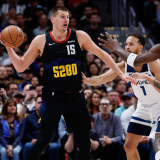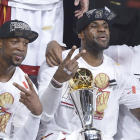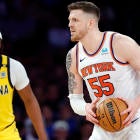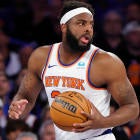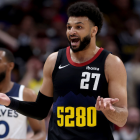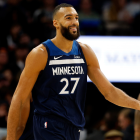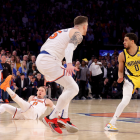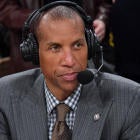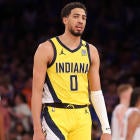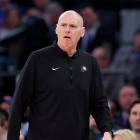The 2017 NBA Finals tip off Thursday, and it features a clash of two teams that hold a legendary regard. The Warriors storm in off a 73-win season -- the best in NBA history -- followed by the most epic defeat in NBA history -- collapsing from a 3-1 lead -- then adding Kevin Durant. They have swept the Western Conference for the first time since the opening round was flipped to a seven-game series, and hold historic marks for offense after acquiring Durant. They are the first team in NBA history to hold the winners of the past three MVP awards.
The Cavaliers completed that epic comeback last year before ripping through the Eastern Conference playoffs once again, with just a single loss to Boston blemishing a nearly perfect record. It is an epic battle that most are expecting, and whoever comes out on top, regardless of the outcome, will be held as a great team historically -- either for the Warriors' outright dominance or the Cavaliers' resounding perseverance in overcoming this great team twice in two seasons behind LeBron James, who has a legitimate chance to go down as the greatest of all time.
Which got us thinking, what are the truly great teams of the new millenium? To that end, I've ranked the 16 best teams since 2001, slotted them into seedings and matchups, and extrapolated what I think would happen. Seedings were based on overall performance from the start of the regular season though the Finals, and factored league and opponent strength, resume, and historical relevance.
Brace yourself for caveats before that blood starts to boil. Remember that this is one interpretation of an entirely debatable exercise, both in the seedings and outcomes.
Here's the field:
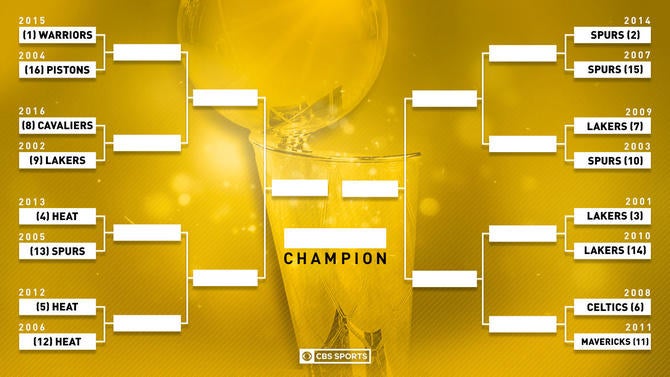
SEEDING NOTES:
- That 2015 Golden State team takes the cake as the No. 1 seed, which is sure to ruffle feathers. After all, Golden State faced a Grizzlies team without Mike Conley and Tony Allen, then the Cavaliers without Kevin Love and Kyrie Irving. But we're also a little close to be able to get perspective. After all, the 2008 Celtics struggled with the Atlanta Hawks in the first round, but no one would deny they were a great team. The 2015 Warriors were the first team in NBA history to lead the league in both pace and defensive rating, something that was considered unheard of at the time. They played fast, but brilliant defense, while spreading the floor to ranges never seen in winning 67 games and losing just five times while knocking off LeBron James, even with his two best teammates missing.
- The biggest outrage is going to be the 2001 Lakers being No. 3, despite going 15-1. Just consider a few factors. They went 56-26, tied for second-best with the Philadelphia 76ers in the regular season. They were 21st in defense in the regular season. There's no way to spin that as good. You can say "They didn't care about the regular season," and that's fine, but not caring cost them the No. 1 seed even if it didn't matter and it costs them a higher one here. The Cavaliers haven't cared about the regular season in the past two years, but you don't see the 2016 Cavs high, either. Second, though they dominated the playoffs, the league was in a bad place in those early post-Jordan years. The 2001 Lakers swept a talented Blazers team, a Kings team whose best run came a year later, and then swept the Spurs. That's a strong run in a weak era, which is why they are still third. Consider that they are still basically a 1-seed if we did a bracket seeding construct like the NCAA tournament.
- The 2014 Spurs take the 2-seed based off 62 wins and a flat-out dominant run through the playoffs, after a rocky start in a seven-game squeaker vs. the Mavericks. They blitzed the Blazers, then knocked off the Thunder, who had one of their best teams of the Durant era, before absolutely annihilating the Heat in one of the most impressive shooting performances that NBA scribes still talk about with awe today.
- The 2013 Heat take the top spot of a LeBron team with 66 wins -- including a 27-game winning streak -- and a bruising through the first two rounds, before winning maybe the best NBA Finals in terms of actual play by both teams, ever, over the Spurs. It also included one of the most memorable shots in Finals history, Ray Allen's corner 3-pointer. This Heat team probably would have been higher for me had it not been for them going to seven games with the Pacers in the conference finals and then being pushed to the brink. Even today many feel that the Spurs were the better team in that series, which is somewhat backed by San Antonio's dominance a year later. However, that 2013 Heat team was truly amazing on both ends of the floor and deserves recognition of this scale.
- Of the truly disrespected teams, it's important to remember that if you're ranking the last 16 champs, someone is going to have to be 16th, 15th, etc. These are all great teams, it's just a matter of how great they are.
- That said, the 2004 Pistons fall to the end. Look, I'm not counting out a team with the defense that squad had, along with Rasheed Wallace, Chauncey Billups, Rip Hamilton and Tayshaun Prince. But the Hall of Fame entrants here are few compared to the other champions on this list. Detroit went to seven games with the Nets in the second round, went six with the Pacers, before shocking the world by dismantling the Lakers' "super-team" in the Finals 4-1. They won just 54 games, and didn't even win their division. (Once again, a great team that didn't necessarily care about the regular season.) Detroit was never dominant ... those guys just won games. Time and time and time again. Their resume is never going to reflect how tough they were to actually play. That team went to six consecutive conference finals. Had the 2006 team not gotten beat by the Heat that year, and had they beaten Dallas as Miami did, they would land way higher.
- Three of the Spurs' five championship teams fall in the final seven spots, which seems awfully rude for a team that won that many titles. But 2005 was the peak of the league's nadir, talent-wise, and they never really faced a great team outside of the Finals vs. Detroit. And that series is remembered as one of the ugliest the league has ever seen. The 2007 squad was basically a desperate combination of the Mavericks getting knocked out by the Warriors in the first round, and the Robert Horry hip check, then facing a LeBron-led Cavs team that was in no way ready for that moment. Of course that team was great -- it was led by Tim Duncan, Tony Parker, and Manu Ginobili. But the resume's not there.
- If the 2016 Cavaliers knocked off the best team of all time, how are they No. 8? Well, for starters, they won only 57 games and, as with the 2001 Lakers, you don't get credit for not caring about the regular season. It's easy to forget, but that team struggled so much through the regular season that they constantly seemed on the brink. They fired their coach mid-way through the season! They were also only 10th defensively, and while they crushed the East, the Raptors still took two, but more importantly, the did have to fall down 3-1 to the Warriors for the best comeback to happen.
- These rankings are based off the "greatest" concept, which again, is subjective. If we're looking at the most "lovable" playoff runs, I'd rank them: 1. 2011 Mavericks 2. 2004 Pistons 3. 2016 Cavaliers.
On to the matchups! These, of course, are hypothetical. We're playing them under today's rules, so imagine you used a time machine and went back to bring them forward. (So, "Bill and Ted's Excellent Adventure" vs. "Back to the Future.") Important note, these matchups are like if they actually played, not just "who was better." So much like in any playoff series, matchups matter more than just overall performance. Also this is for fun, and you can convince me that any of these teams can beat any of these other teams. They were all awesome.
UPPER LEFT
1) 2015 Golden State Warriors vs. (16) 2004 Detroit Pistons: The Pistons boasted one of the fiercest defenses of the era, and this would be a fascinating matchup, particularly with the kind of floor spacers and positional versatility the Pistons had. They could combat the Warriors' smallball as effectively as any team of this era. But it should also be noted the Pistons shot 30 percent from 3-point range in those playoffs, and 34 percent in the regular season. The "Math Problem" would have been huge for Detroit, which could play great defense and still find themselves in a 10-15-point hole. I wouldn't count out Detroit; its ability to nullify what the other team did well was legendary, but I think the Warriors find a way in what is probably a longer series than you'd expect.
Winner: 2015 Warriors in six (advances to next round)
(8) 2016 Cleveland Cavaliers vs. (9) 2002 Los Angeles Lakers: Either of the early 00's Lakers teams come with a glaring problem: "How do you stop Shaq?" No one could do it then, so how would the Cavs? The answer is that they are not. The Cavs would have to sacrifice Timofey Mozgov to some hack-a-Shaq moments, and the Diesel would have a monster series anyway. But the Cavs would help, every time down, and the Lakers' shooters just weren't really that good. Meanwhile, let's assume Kobe Bryant, at age 23, takes the defensive assignment on Kyrie Irving. The Lakers probably aren't switching, which means that Kevin Love is open in pick and pops every time. The Lakers would have 31-year-old Robert Horry either trying to guard Love in those situations, or trying to guard LeBron James at his peak. If not Horry, then Rick Fox is taking that assignment. Good luck. Shaq and Kobe would eat, and eat, and eat. But unlike any of the teams the Lakers faced that season, the Cavs have way more talent. In some ways, the Cavs are like a super-version of that Kings team that came within a few, ahem, calls, of knocking off L.A.
Winner: 2016 Cavaliers in six (advances to next round)
(1) 2015 Golden State Warriors vs. (8) 2016 Cleveland Cavaliers: Ruh-roh. I mean ... Look, how am I going to reasonably say the Cavs don't win, here? They beat the same Warriors team the year after they won the title, only when they won more games. They had one of the best LeBron James performances ever. How on Earth am I going to justify anything but the Cavs winning?
Here's how. Two things: defense and probability. As for the latter, let's go back to Game 5 for a minute. Even assuming Draymond Green is suspended for Game 5. If we play out that series 1,000 times, how many times are the Cavs winning three straight? How many times is Andrew Bogut getting injured? If we go back and play the 2015 Warriors, with a healthy Steph Curry, vs. that 2016 Cavaliers team, do the Cavs still win? Look, that 2016 comeback was the greatest comeback in NBA Finals history. Maybe in all of sports, battling with the 2004 Red Sox over the Yankees in the ALCS. But the reason it was the greatest comeback ever is because of how improbable it was. Second, the Warriors' biggest problem last year, and it showed up regularly and just didn't matter because of their offense, was that they got away from their defensive identity. The 2015 team knew how to value defensive possessions and not just chase big momentum shots. They play better and topple last year's Cavs ... though just writing that after what LeBron pulled off makes me absolutely nauseous.
Winner: 2015 Warriors in six (advances to Final Four)
LOWER LEFT
(4) 2013 Heat vs. (13) 2005 Spurs: Well, the 2013 Heat beat a superior Spurs team. Yes, Duncan, Ginobili and Parker were all younger and had more in the tank. And their defense was superb. This one is probably a lot closer than most would expect. But you're looking at Horry (again) or Brent Barry having to guard LeBron James, at his absolute peak. Meanwhile, you can hide Tony Parker on Mario Chalmers, but Bruce Bowen can only guard Ray Allen or Dwyane Wade, but not both. And Duncan wins his matchup against Chris Bosh, but Bosh would at least get enough points to not get crushed. This one probably goes seven games, honestly, just based off near-peak-Duncan.
Winner: 2013 Heat in seven (advances to next round)
(5) 2012 Heat vs. (12) 2006 Heat: Wade vs. Wade! The Shaq problem is in play here as well, but O'Neal wasn't the same. That 2006 Heat team was lovable (if you weren't a Mavericks fan), but ... that Heat team's third-leading scorer was Antoine Walker. This one feels like it might have been a bit of a rout. Shaq probably takes a game or two, but no more. And who better to guard 2006 Wade than 2012 Wade, who knows all his tricks?
Winner: 2012 Heat in five (advances to next round)
(4) 2013 Heat vs. (5) 2012 Heat: No one wins here, because this causes a rift in the time-space continuum and all of existence is torn apart. OK, I'll give the slightest of edges to the 2013 Heat team. They finally figured out how important smallball was, the roster was a bit more perimeter-oriented, they added Ray Allen, etc. It's pretty close, though. Do you want 3-point shooting LeBron or the one year where he really embraced the post? Then again, he'd be guarded by himself, so... my head hurts.
Winner: 2013 Heat in seven (advances to Final Four)
UPPER RIGHT
(2) 2014 San Antonio Spurs vs. (15) 2007 Spurs: This is a beatdown. The 2007 Duncan goes for big points. Tony Parker tears up his older self like it's "Looper." Manu Ginobili and Manu Ginobili constantly double-flop. But the supporting cast for 2014 rips that Spurs team to shreds, even with what might have been a better defense. The 2007 Spurs are in awe of Kawhi Leonard and have no counter. (Good luck, 33-year-old Michael Finley!) Boris Diaw and Danny Green have huge series and the Spurs just overwhelm their younger selves with ball movement.
Winner: 2014 Spurs in five (advances to next round)
(7) 2009 Lakers vs. (10) 2003 Spurs: OK, this one is fascinating. You have peak Duncan vs. peak Kobe. Bowen probably gives Bryant some trouble, but he's still going to dominate. Pau Gasol vs. Duncan is a terrific matchup. Lamar Odom is kind of my swing vote here. He was too big for Stephen Jackson or Bruce Bowen, too quick for any of the Spurs' bigs. I'm not super fond of how 37-year-old David Robinson would have to guard prime Pau, either. (Though prime Robinson would annihilate prime Gasol into little tiny pieces.) This probably goes seven games, with an ugly, off-kilter Game 7 going to the Lakers on the back of some shots from guys like Trevor Ariza, and a few dominant minutes from Andrew Bynum.
Winner: 2009 Lakers in six (advances to next round)
(2) 2014 Spurs vs. (7) 2009 Lakers: I'm just not sure the Lakers would be able to deal with the ball movement the Spurs would throw at them. Kawhi Leonard vs. prime Kobe Bryant would be amazing beyond belief. Pau Gasol likely gets the edge on that version of Duncan, but Tony Parker still gets the edge on Derek Fisher. The Spurs had a better offense and a better defense (in a tougher offensive era) than that Lakers team did. If necessary, the Spurs could sacrifice Danny Green to get torched by Bryant while Leonard battles Odom's versatility in a stretch-four matchup more to Leonard's liking than some he faced. This one's probably really close, again, with the matchups the way they are. But the 2014 Spurs beat a peak-LeBron, a still-great Wade, and a peak-Bosh along with Ray Allen, and did so in dominant fashion. Just hard to see them getting beat here.
Winner: 2014 Spurs in six (advances to Final Four)
LOWER RIGHT
(3) 2001 Lakers vs. (14) 2010 Lakers: That 2010 team? Not great. Struggled in the regular season, not even top-10 in offense, struggled against the Thunder in the first round, struggled against the Suns in the Western Conference finals, almost got beat by what was, in all honesty, a really mediocre -- by Finals standards -- Celtics team. (To be clear, that Boston team didn't struggle due to their roster which was still legendary. Those Celtics were pretty gassed by the time the Finals got there, and then they lost Kendrick Perkins.) Meanwhile, Pau Gasol is trying to stop peak-Shaq and Robert Horry is around to give Odom a hard time. Metta World Peace probably guards young Kobe, giving old Kobe more energy, but that 2001 team is just too dominant inside and the 2010 team couldn't spread the floor enough.
Winner: 2001 Lakers in five (advances to next round)
(6) 2008 Celtics vs. (11) 2011 Mavericks: Upset! OK, I say this with full and complete respect for that 2008 Celtics team, which is why I had them as a sixth seed here. Their defensive was amazing, and they had so many extremely clutch players. But even with Kevin Garnett guarding out-of-his-mind Dirk Nowitzki, the Mavericks have too many counters. Shawn Marion is slipping to the basket. Jason Terry is getting free on 3-pointers. Tyson Chandler is protecting the rim. The 2011 Mavericks were not impressive on paper but they were damn impressive when they played. They swept the defending champions in the second round. Dallas has the 3-point advantage, a versatility advantage and DeShawn Stevenson to do something completely insane. Rajon Rondo wasn't quite ready for what he'd need to be in this matchup. Pierce goes off, but the Mavericks are too balanced.
Winner: 2011 Mavericks in seven (advances to next round)
(3) 2001 Lakers vs. (11) 2011 Mavericks: Well, the Mavericks at least have a guy who can guard Shaq for a while with Tyson Chandler. And the 3-point problem is really an issue here. But the Mavs have no one to guard Kobe Bryant at that point. He's too athletic, too fast and can score in volume. Horace Grant and Horry are getting torched by Nowitzki, but eventually, the Lakers just get too much going inside, even as the Mavericks keep hitting 3's.
Winner: 2001 Lakers in seven (advances to Final Four)
FINAL FOUR
(1) 2015 Warriors vs. (4) 2013 Heat: Down go the Dubs! The Heat's 2013 "skirmish" defense was able to constantly rattle teams with ball pressure. The 2015 Warriors' biggest Achilles heel was turnovers. With a more mobile and athletic big in Chris Bosh, the Heat are able to trap Steph Curry and give Draymond Green problems, while Wade's scoring nullifies Klay Thompson. If the Warriors go to their smallball lineup, that means Harrison Barnes is guarding LeBron full time because Draymond Green has to check Bosh, or else Bosh is ripping Barnes to shred out of the face-up in the post. (Barnes is actually great as a post defender, but Bosh would turn, face-up and shoot over him.)
Curry, who has been good but not otherworldly in the playoffs/Finals until this year, sees constant pressure, and the Heat are one of the only teams in this entire bracket comfortable with battling at Golden State's pace, and who can rely on peak LeBron James to carry them home. I legitimately think that Golden State wins against any other matchup in this entire bracket. Bad luck.
Winner: 2013 Heat in six (advances to Finals)
(2) 2014 Spurs vs. (3) 2001 Lakers: Same deal as the 2002 matchup. There is no denying how much Shaquille O'Neal would eat in these matchups. He'd ruin teams. He'd be incredible. But you're still facing the math problem. If Shaq scores five out of 10 possessions with three 0-for-2 Hack-a-Shaqs and two misses, that's 10 points on 10 possessions. If the 2014 Spurs score four times in 10 possessions with two 3-pointers and two made baskets, that's 10 points on one fewer made shot. That's the level of efficiency O'Neal would have to score on. (O'Neal shot 56 percent in the playoffs.) Put it this way. In 2001, the Lakers led the league in the playoffs with a 108.8 offensive efficiency. In 2014? The Spurs had a 112.7 offensive efficiency, in a more talented league, and that Lakers mark would have ranked fifth behind the Clippers.
That's not to say that the Lakers weren't better than the Clippers, or any of the teams outside of the Finals that year. But comparing across eras, that 2001 Lakers team just did not have the weapons to keep up. (Notable: That 2011 Mavericks team they beat in the last round had a 110 offensive efficiency. It's possible that same problem happens there.)
Winner: 2014 Spurs in seven (advances to Finals)
FINALS
(2) 2014 Spurs vs. (4) 2013 Heat: There are two ways to look at this.
- The 2013 Spurs were a random angle on a rebound/one Tim Duncan substitution/one Ray Allen corner 3-pointer away from winning that series in six games. Then they turned around and blistered them the following year. Kawhi Leonard was better in 2014. Boris Diaw was better in 2014. The Spurs shot so well that no one in the universe was going to keep pace with them (outside of the 2016 Warriors, who, had they won last year are probably in this matchup instead). The Heat won in 2013, but they weren't the better team, some might say.
- The 2013 team beat basically this exact same team. The 2014 Heat were worse, the 2014 Spurs weren't that much better. Plus, it's pretty easy to agree that the Spurs shot unsustainably well in 2014, even they marveled at their shooting performance. I asked Danny Green after Game 4 if the Spurs could actually play any better than they had, and he struggled to find specific ways they could do so. That's how good they were at shooting, but it's also not likely sustainable. Plus, if you remember, the Heat lost Game 1 in 2014 when the air conditioning in AT&T Center went out and LeBron James cramped up. That doesn't happen with a fresher LeBron in 2013.
I'm going to give the edge to the 2013 Heat. They were a better team that season, and the Spurs in part became so great in 2014 because of that failure in 2014 motivating them. I don't think the shooting was sustainable, I think most of the matchups play out the same way, and the 2013 Heat team always found a way with the best version of LeBron we've ever seen. It definitely goes seven, however.
WINNER: 2013 Heat in seven (bracket champion)
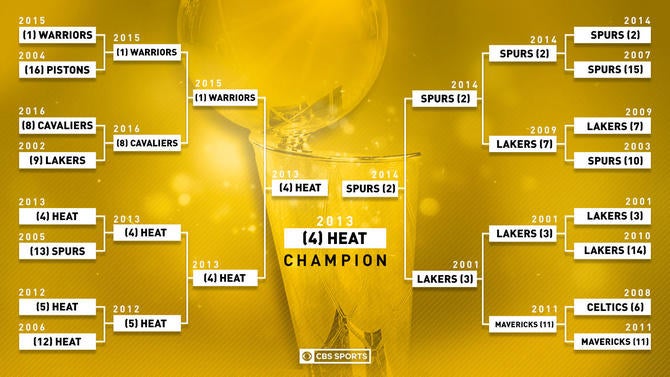
In the end, chances are you disagree with some (or all) results of this bracket. And that's good! We'll never have a way to really know who would win. I'll leave you with this. The one thing I've heard from the winning locker room of each NBA champion after they've won the title is a single line. It is the lone thread no matter who the players or teams are, or how they won. Several players will inevitably say "No one can take this away from me/us." That's what you should remember, that it doesn't really matter who's better between these teams because they've each accomplished something extraordinary and should be honored for it.
The 2013 Heat came out on top in this imaginary bracket. But in reality, they all share the same top honor. They are champions.








